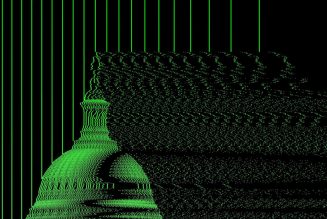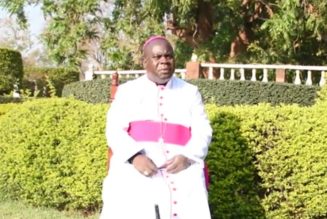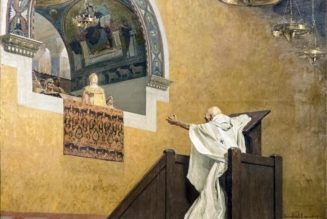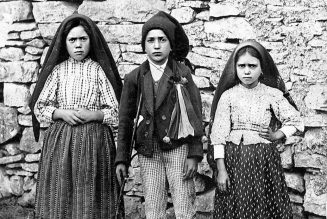By Dr. Jeff Mirus ( bio – articles – email ) | Jul 09, 2024
A few days ago, a Mexican woman who claimed to be a witch attempted to kidnap her nephew’s baby so she could offer the baby as a human sacrifice to Santa Muerte (Saint Death), the patron of drug cartels. When she entered the home with two men to take the baby, the father struck her with a baseball bat, resulting in her death, and the others fled the scene as neighbors became aware of the home invasion and called the police.
Such incidents brings us face to face with something we in the “cultured” West generally no longer understand, namely the horrifying existence of pure evil and the corresponding action of evil spirits—that is, of devils. We get a glimpse in this incident—despite the twisted Catholic overtones—of the devil worship that characterized the peoples surrounding the Jews in the Old Testament, as they sought to carve out a space for worship of the true God. For the surrounding peoples worshipped demons, and engaged in child sacrifice.
But because of God’s intervention in human history, and ultimately through the coming of Christ and the establishment of the Church, we can have a greater understanding even of evil itself, and of how it must be combatted.
The Ways to God
Such experiences can (and ought to) drive us back to God, but in this world there will always be forces pulling us in the opposite direction—our own passions, human ideologies, and entire social orders which debase authentic human liberty into a kind of egotistical license. It may be useful, therefore, to ready our minds for a proper response to diabolism by briefly reviewing the arguments for the existence of God in the first place—arguments which may clear a path to faith.
Perhaps the most universal (and certainly the most abstruse and therefore somewhat doubtful) argument for the existence of God was the so-called “ontological” argument offered by St. Anselm of Canterbury (1033-1109). Anselm argued that there must exist a being “than which nothing greater can be conceived”, and that this being is God. In a sense, then, the very definition of God becomes a proof. There is more than one form of this argument, but most of us will get lost in the mental syntax of the case. Anselm found it convincing, but many other saints—including St. Thomas Aquinas—rejected it. It is, in any case, a somewhat dizzying argument, which makes one all the more grateful for less linguistic arguments, and for Divine Revelation itself.
There are a handful of more straightforward arguments. For example, the argument from “nothing” reasonably points out that in the natural world something cannot come from nothing, and therefore there must be an eternal being for anything else to come into existence. The related argument from design, of course, is that the order we perceive in nature proclaims that it is designed, and this is impossible without a Designer—namely, God. The Prime Mover argument is very similar: We see that everything is effected, or changed, or comes into existence through the action of something else, but without something to start this sequence of activity, nothing would ever happen at all—hence the Prime Mover or Unmoved Mover, which is God.
The argument from contingency is another variation on the same theme (and my personal favorite in this class of arguments). In our experience, everything is contingent on something else, and without that contingency there is no single thing in our experience that would exist at all. Thus, for there to be anything at all, there must be some non-contingent being, and that being we call God.
Our own “non-material” awareness
These philosophical arguments about the existence of God simply clear our minds of secularist prejudices and materialist fallacies. But there is a different sort of “contingency” which is spiritual in nature. Each person recognizes in himself an intellectual capacity and also the ability to choose freely between one option and another. These capacities do not exist anywhere else in nature. Even the most advanced animals show no sign of such abstract, self-reflective abilities. Animal patterns of life are completely controlled by instincts—that is the patterns of action and the responses to stimuli that are built into them. No animal ever does anything new, or creates any intellectual or artistic work, or develops new civilizations or deliberately changes its patterns of life over time. And while animals do communicate, they do not develop languages—a degree of creative abstraction which is obviously a bridge too far. Nor does any other natural being give evidence of self-reflection or any sort of self-understanding.
Even in the most exhaustive experiments, the “smartest” animals have never been trained by humans “intellectually” beyond the approximate level of a human two-year-old. And from all these considerations, we recognize that our capacity for intellectual abstraction, of conceptualizing the things around us and the situations we face, of considering their elements in our minds, and of making decisions about them—all these uniquely human manifestations of intellect and will—are not material but rather precisely spiritual qualities and capabilities. We alone, of all material beings, actually intellectualize the problems we face and exercise our own will in responding to these problem. Indeed, for better or worse, only humans rationalize. Therefore, we recognize in ourselves a spiritual component, and this too could only come from a spiritual source, which we call God.
Moreover, we alone of all material beings struggle with a moral sense, a sense of right and wrong. This too indicates a non-material capacity, a spiritual capacity. St. John Henry Newman made much of these universal human capacities by noticing that we also feel as if we are living under a judgement, as if there is some fundamental law to which we are called by our very nature to adhere, and this makes us concerned even about the morality of our very thoughts! But if there is a judgement there must be both a law-giver and a judge. And this law-giver and judge can only be God.
Newman, of course, famously reasoned that if God exists and He cares how we behave, we ought to assume that he would reveal His will to us, and so we ought to look for a Revelation. Such a revelation ought to be attended by publicly-witnessed signs and wonders that mark it as of Divine origin. We can further see that there are no religions in the history of mankind that claim publicly-witnessed miracles as signs of a Divine revelation other than Judaism and Christianity. When we look into the Revelation associated with these two religions, we find the answers we seek, and when we realize that Christ, the Church and Catholicism are the fulfillment of the history of the Jews, the Temple, the Law, and the Prophets, then we know to Whom we must turn, and where we will find Him.
The dangers we face
These observations and arguments take us a long way, but there is also another argument, the argument with which I began, and the argument that has frequently propelled the unwary into idolatry. It is the argument from what we might call the human experience of the preternatural—of spiritual powers beyond our own but still, if we could but realize it, far below the supernatural powers of God Himself. I am referring to the strange, sometimes ghostly phenomena people experience which convinces them that there are spiritual realities around us that we ought to fear. I am referring, as at the beginning, to what we call the preternatural powers of demons (and also of angels), the temptations presented by the demons, and their manifestations in our lives which can enslave us to evil.
These were the powers of Ba’al and other “gods” mentioned in the Old Testament, which demanded the sacrifice of children to ensure success and prosperity; and also the powers of the one Christians know as Satan, powers which can still tempt, terrorize, enslave, obsess, or even possess those who are spiritually unprotected from attack and manipulation. What we see throughout history is that these frighteningly real diabolical activities increase in frequency and intensity in pagan cultures, decrease almost to the point of disappearance in actively Christian societies, and rise again in frequency and terror as Christianity declines and becomes an object of contempt.
Who can doubt the ferocity of the attack in a culture which glorifies untrammeled personal self-determination, drugged “highs”, sexual depravity, gender change, and abortion? Thus does diabolical activity reduce itself to mere temptation when Christ is present yet increase into manifest and even possessive manipulation among persons, groups and societies whenever they fall into a rejection of Christ and His Church. This is the story with which we began, the story of both child sacrifice to Ba’al several thousand years ago and child sacrifice to Santa Muerte in our own day. For Satan always prefers to appear as an Angel of Light (Lucifer) where Christ has influence, but reveals Himself as the Prince of Darkness where Christ is rejected. It does not hurt, then, to review the arguments from time to time, lest we grow slack, lest we grow spiritually numb.
Ultimately, of course, everything comes down to this very problem of Christ vs. Satan, and every moment of serious reflection on this problem presents us with an equally serious challenge—the challenge of how we respond to the difference between the powers of good and the powers of evil in our own time, and in our own place. We may not be able to come up with successful strategies for conversion. But at least we must not permit ourselves to slide down any slipperly slopes, to experience any attrition in our dedication to Christ. Perhaps we are especially called in our current situation simply to be courageously consistent. Perhaps this is why Our Lord insists that we must neither dissemble nor conveniently fritter our spiritual commitment away—that we must always and forever let our “Yes” be yes, and our “No” be no (Mt 5:37). For “anything else,” He said, “belongs to the Evil One.”
Sound Off! CatholicCulture.org supporters weigh in.
All comments are moderated. To lighten our editing burden, only current donors are allowed to Sound Off. If you are a current donor, log in to see the comment form; otherwise please support our work, and Sound Off!

There are no comments yet for this item.






![A writer, raised by atheist parents, reflects on the brilliance of ‘A Charlie Brown Christmas’ [you may hit a paywall here, but it’s well worth reading]…](https://salvationprosperity.net/wp-content/uploads/2021/12/a-writer-raised-by-atheist-parents-reflects-on-the-brilliance-of-a-charlie-brown-christmas-you-may-hit-a-paywall-here-but-its-well-worth-reading-327x219.png)



